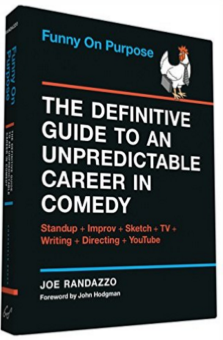I recently read “Funny On Purpose: The Definitive Guide To An Unpredictable Career in Comedy” by Joe Randazzo. Below are the quotes I found most interesting. If you like the quotes, click here to buy the book.
 “As in all of the arts, fortune favors the persistent much more than the merely talented.” -John Hodgman (12)
“As in all of the arts, fortune favors the persistent much more than the merely talented.” -John Hodgman (12)
“I have never been badly served by stopping before typing a word or taking a step on stage and asking myself: Why am I doing this? What do I have to say – need to say – on this specific day, to this group of people? It takes rigor, and a certain brave honesty, because sometimes the answer is small and dumb.” -John Hodgman (13)
“In a comedy-saturation era, where every joke you can think of has already been made five times, twelve minutes ago, knowing yourself is not merely essential to being funny, it is more important than being funny.” -John Hodgman (13)
“The seven traits of highly successful comedy people: 1. Self-Doubt 2. Excellent Procrastination Skills 3. Fear of the Unknown 4. Laziness 5. Fear of Failure 6. Poor Planning 7. A Need to Express Something to the World” (15)
“A character who innocently and earnestly pushes stupid, even dangerous ideas is infinitely funnier than a character who speaks in wisecracks.” -Jack Handey (23)
“It’s funnier – and perhaps more sympathetic – if a character doesn’t know that he’s being mean. If he’s oblivious and actually thinks he’s nice.” -Jack Handey (24)
“The two primary functions of comedy are: to push the bounds of comfort and to challenge authority. Without these two principles – and an important and universal third principle, which is to smear the edges of tragedy with a shared sense of the absurd – one does not have comedy.” (38)
“If The Onion is doing its job right, each article should offend at least a thousand people.” (40)
“When I’m running a show, I’m really looking for jokes from new writers. It’s great if they have story pitches. I mean, we need them, but a great way to contribute is to really listen to want the room and show runner want and pitch within that framework.” -Danny Zuker (76)
“The worst thing any writer can do is get married to their ideas. Write a book if you want final say, but in TV it’s collaborative. And don’t take a rejection of your jokes or stories as a rejection of you. You really need to take it with a smile and keep pitching.” (76)
“Cut anything that you wouldn’t read aloud in front of the people you hope will hire you. Then go through and do it again. ANd again, and again. I know that less than 1 percent of comedy writers actually do this, but I also know that 97 percent of that 1 percent are currently working on a show somewhere.” (79)
“There are five essential building blocks of great comedy performance… Relatability, timing, shamelessness, yelling and vulnerability.” (124)
“The job of the comedy performer is to be able to expose the raw inner animal of the human being at a moment’s notice – to look like a fool. If there’s even a hint of worry or concern about how one will look, the spell is broken and the comedy is dead.” (124)
“A good primal yell is equal to thirty-seven solid spit takes or nine pratfalls. It represents the deepest, least-eloquent form of communication, the bottom rung of emotion, hopelessness, the last straw. In other words: comedy itself.” (125)
“Liana Maeby said, “In some ways, the best career advice might be to figure out how to get to a place where you can be happy for other people’s success.” (136)
“Good characters are funny because of who they are and how they act, not necessarily because they tell jokes.” (190)
“The key is knowing the intention of the scene. If you know you have to et from A to B, and you have to hit certain emotions and story points to be clear, you can have fun along the way, but the intention of the scene must be the same.” -Judd Apatow (215)
“When considering the business of comedy, these are the core questions:
What are you selling?
Who will buy it?
What do they want from it?
How does it compare to everything else in the marketplace?” (301)
“Any good show usually starts from character.” -Kate Adler (317)
Liked the quotes? Buy the book here.

